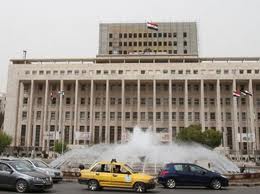 Despite efforts to cement a fraying cease-fire, the Syrian authorities said on Monday that attackers had fired anti-tank rockets at the office of the Central Bank in the capital, Damascus, and injured four police officers in a separate attack on a police patrol there.
Despite efforts to cement a fraying cease-fire, the Syrian authorities said on Monday that attackers had fired anti-tank rockets at the office of the Central Bank in the capital, Damascus, and injured four police officers in a separate attack on a police patrol there.
The official SANA news agency also reported that an “armed terrorist group” — the official term for rebels opposed to President Bashar al-Assad — had detonated two bombs close to a military compound in the northern city of Idlib, describing the assailants as suicide bombers who killed eight people and wounded nearly 100.
The Syrian Observatory for Human Rights, an opposition group operating from Britain, said more than 20 people had been killed in Idlib, most of them government security forces at buildings used by those forces.
Because of reporting restrictions in Syria, it is difficult to corroborate such accounts. But, if borne out, the news of an attack on the Central Bank would suggest that rebels wish to display an ability to strike at emblems of state power, despite months of bloody military action against them by government forces.
The incidents — and the authorities’ apparent desire to be first to report them — underscored the difficulties facing a small team of United Nations observers sent to Syria to monitor a truce devised by Kofi Annan, the special envoy appointed by the United Nations and the Arab League. The SANA news agency said the attack at the Central Bank on al-Sabaa Bahrat Square in Damascus caused “only material damages.” Weeks after it theoretically came into force in early April, the cease-fire has not fulfilled two of its prime aims: to stop the fighting that has become the bloodiest of the broader Arab revolt against despotic rulers; and to force the Syrian Army to return to barracks.
Anti-government activists have labeled it a failure, an assessment echoed by senior Obama administration officials questioned in Congress last week.
”What is obvious and indisputable is that the Kofi Annan plan has failed,” Senator John McCain, Republican of Arizona, said on Thursday at a hearing of the Senate Armed Services Committee. “Assad has not abided and will not abide by a cease-fire.”
Since the Syrian government accepted the plan a month ago, at least 1,000 Syrians have died and thousands more have been displaced, Mr. McCain said. “The United States and the world are failing the people of Syria and every day that we refuse to lead, more Syrians will die,” he said.
If it is expanded as Mr. Annan has proposed, the United Nations cease-fire monitoring force will grow from about 15 in Syria now to its full strength of 300 over the next few months. Supporters of the plan, who say there is no realistic alternative to it, maintain that the presence of a larger force will deter the violence that has been building since March 2011, claiming thousands of lives.
Despite the monitors’ presence, Syrian government forces have attacked cities as soon as monitors have left them. The opposition has accused the government of assassinating nine activists in the restive central city of Hama who had met with the United Nations team.
The accounts published on Monday by the SANA news agency may have been designed to counter such reports by showing that the armed rebels are also in breach of the flawed truce.
The Syrian Foreign Ministry in Damascus has said it sent a letter to Mr. Annan listing 1,149 ’”documented and verifiable violations, by armed elements,” of the cease-fire, urging the United Nations Security Council to act “evenhandedly toward violations.”
The Norwegian head of the United Nations observer forces, Gen. Robert Mood, arrived in Damascus on Sunday promising to “work with all side of the Syrian crisis” to halt the violence, SANA reported.
NY Times

Leave a Reply
You must be logged in to post a comment.